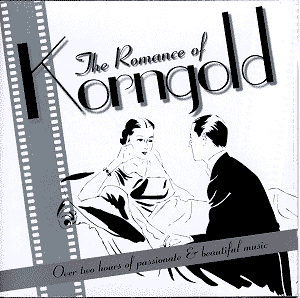This set ranges far and wide through the triple catalogues
available to Universal. The Mauceri tracks are from Philips and Decca
(Entartetemusik series) and the Previn from DG. I was surprised (and
pleased to see two tracks licensed from ASV - they haven't been gobbled
up by Universal?). The recordings are very fresh - the oldest being
1991 (the Robin Hood music) and the most recent from 2000.
From the soporific dreamy intermezzo (Much Ado About
Nothing)it is not a far cry to the Love for Love music from
Escape Me Never. However the flattish cocktail of sentimentality
and grand salon overlaid by Bruce Fowler's arrangement (which was in
turn based on Hugo Friedhofer's orchestration) is really too much. I
am however impressed by the technique that twin-tracked the composer
playing this piece solo with John Mauceri (in the majority as a conductor
on this set) conducting the Hollywood Bowl Orchestra. Mauceri allows
a far too soft contoured approach in the Robin Hood music which
drags rather than beguiles. Previn and the LSO are far more alert in
The maiden in the chamber interlude from Much Ado. Mention
of Previn and the LSO reminds me that Previn conducted the LSO in a
BBCTV studio broadcast of the Korngold Violin Concerto (now, who was
the violinist? Possibly Ulf Hoelscher?) back in the very early 1970s.
Previn returns later with the adagio only from the Symphony.
This is taken at a sway that points up parallels with another epic symphony
championed by Previn in the early 1970s: the complete Rachmaninov Symphony
No. 2. Caspar Richter and the Linz Orchestra are outstanding amid such
eminent company; indeed the ASV disc from which this comes is amongst
the strongest of the Korngold discs in the catalogue.
The Zwischenspiel from Das Wunder der Heliane
injects some much needed acrid corrosion into the proceedings. Surprising
similarities with Elgar Pomp and Circumstance No. 4 are to be
found here. This is superb Korngold material with Mauceri directing
the RSO Berlin. The Theme and Variations is nicely done though
not exactly indispensable EWK. I liked the Between Two Worlds music
- four tracks that I could easily imagine appealing to the late Charles
Gerhardt. The music is very susceptible to swooning but the unforceful
dissonance of the solo piano and the fantasy of many pages are appealing.
The Symphonic Serenade (of which we get only the Allegro moderato)
is a natural cousin to the string serenades of Dvorak and Tchaikovsky.
The second disc is dominated by the human voice, Renee
Fleming in plummy voice gives us Marietta's Lied from Die
Tote Stadt while Matthias Goerne (always a real treat) sings Mein
Sehnen, mein Wahnen from the same opera - pacing and grading his
singing in the dreamy way of German romance linking with the tradition
shared by Pfitzner's Deutsches Seele, the songs of Othmar Schoeck
and the tragically neglected orchestral songs of Josef Marx. Anna Tomowa-Sintow
struggles with Ich ging zu ihm rather than riding triumphant
over the music. Anne Sofie Otter is the finest female singer in this
collection and is heard in the by no means obvious Shakespeare settings
of Songs of the Clown (in English). Bengt Forsberg is von Otter's
match. I note von Otter's utterly accomplished and natural accent. These
songs vie with the strong tradition of Shakespeare settings by English
composers.
I had never previously heard the Passover Psalm
but am pleased to make its acquaintance not that it is desperately
memorable. It shares material with the lied taken by Goerne. It is from
the tradition of Bruckner's and Brahms' choral music.
The Flesch Quartet show us what can be done when Korngold
is kept light on his toes rather than being soused in adipose languor.
The ASV tracks show up well in this company.
To close a shaken-down and tight-packed collection,
Gil Shaham and Previn with the LSO are to be heard in the Violin Concerto
- complete - thank heavens. This is a recording held in high regard
- and with justice. Shaham and Previn treat the concerto with respect
as well as zest - listen to those lightning flourishes in the final
ten or so bars of the Moderato. Shaham relaxes more than Ulrika
Anima-Mathe on my reference version on Dorian. His tone is aureate,
aristocratic and yet youthful. While I would steer clear of Heifetz
(breathtaking but steely and unyielding - impressive on Heifetz's terms
not Korngold's) you should also watch out for Ulf Hoelscher's version
which can still be found on EMI Redline. DG's 1994 team of engineers
trounce most of the competition (though not the opulent Dorian team)
on the technical front.
Minimal highly competent notes from Jeremy Nicholas.
A generous double CD set with a predominance of slower
paced romance - what you see (in the title) is what you get to hear.
This does not fit the bill if you want one set to represent Korngold.
It instead explores and expresses the thick and dreamy seam in Korngold's
imagination and stylistic tradition.
Rob Barnett

![]() Various artists
including: Gil Shaham, LSO/Previn, John Mauceri. Flesch Quartet, Caspar
Richter/Linz Orchestra, RSO Berlin, Von Otter, Bengt Forsberg.
Various artists
including: Gil Shaham, LSO/Previn, John Mauceri. Flesch Quartet, Caspar
Richter/Linz Orchestra, RSO Berlin, Von Otter, Bengt Forsberg. ![]() DG 461 834-2 [CD1
78.05; CD2 74.27]
DG 461 834-2 [CD1
78.05; CD2 74.27]